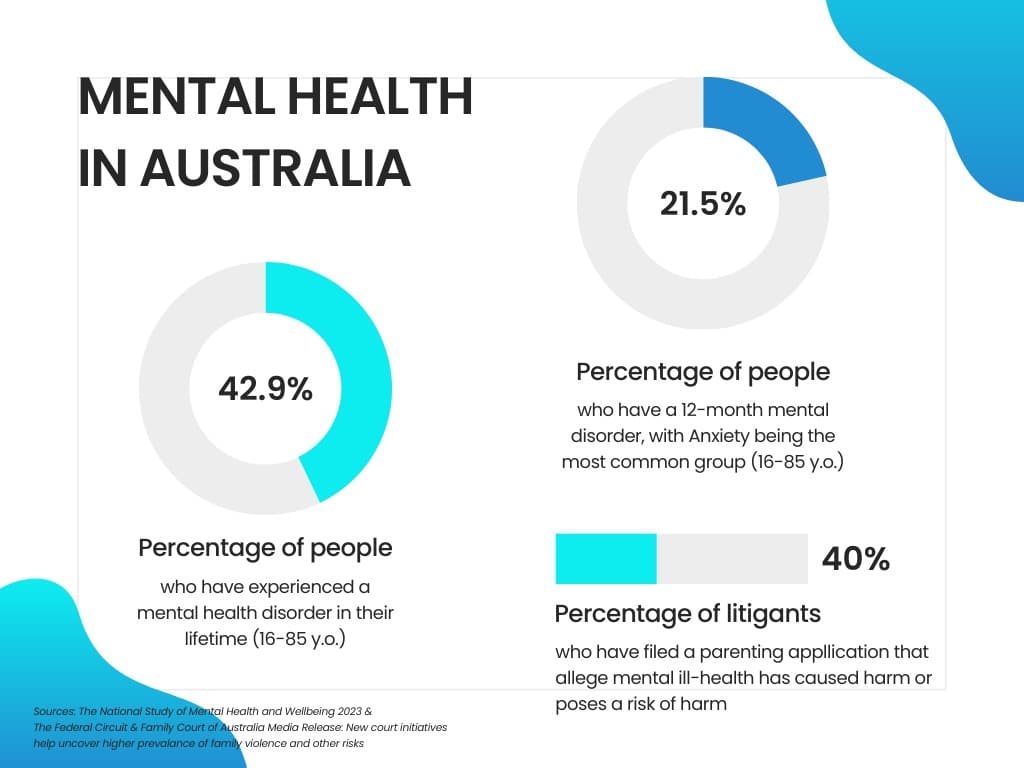
Mental health is prevalent in today’s society, with 45% of
Australians aged 16-85 having had experienced a mental disorder at some time in
their life. It is no wonder that the issue of mental health features regularly
in parenting disputes, and one that is considered regularly by the court. In
fact, according to the Lighthouse Project, the recent initiative of the Federal
Circuit and Family Court of Australia, initial court data
reveals that 40% of parties who have filed a parenting application allege that
mental ill-health of a party has caused harm or poses a risk of harm to a
child. It’s therefore important to consider the approach of the court in
relation to mental health and effect in parenting disputes.
Mental health and the best interests of the child
As with all parenting matters, the court’s paramount consideration when deciding what parenting orders to make is what’s in the child’s best interests. Section 60CC of the Family Law Act sets out the factors that the court must consider when determining what is in the best interests of the child. A parent’s mental health can relate to several of the factors listed in Section 60CC, as it can significantly impact their ability to meet the needs of the child and create a safe and nurturing environment. Here’s how a parent’s mental health may relate to the Section 60CC factors:
· The need to protect the child from physical or psychological harm, abuse, neglect or family violence: Mental health issues in a parent can sometimes be associated with emotional or psychological harm. If there is an “unacceptable risk” that a parent’s condition will result in behaviour that can cause significant harm to a child whether physically, emotionally, psychologically or otherwise, then a court is unlikely to make an order that the child spend unsupervised time with that parent.
· The benefit of the child having a meaningful relationship with both parents (if it is safe): A parent’s mental health may influence their ability to maintain a meaningful and safe relationship with the child. If a parent’s mental health issues create an environment that may pose risks to the child’s well-being, the court may need to carefully consider the extent to which the child should allowed to have a meaningful relationship with that parent.
· The nature of the relationship of the child with each parent and other significant people: A parent’s mental health can affect the nature of the child’s relationship with them. If the parent’s condition causes instability or inconsistent care, it may impact the child’s relationship with that parent and what orders a court is willing to make.
· The extent to which each parent has fulfilled or failed to fulfill their obligations as a parent and any other child support responsibilities: Mental health issues can affect a parent’s ability to fulfill their parenting obligations. The court may consider whether a parent’s mental health has hindered their ability to provide care, support, or maintain regular contact with the child.
· The practical difficulty and expense of a child spending time with and communicating with a parent and whether that difficulty or expense will substantially affect the child’s right to maintain personal relations and direct contact with both parents on a regular basis: A parent’s mental health may impact their ability to spend time with and communicate with the child. For example, if a parent’s condition necessitates significant additional support or accommodations, the court will consider whether such difficulties substantially affect the child’s right to maintain a relationship with that parent.
· The capacity of each parent to provide for the needs of the child, including emotional and intellectual needs: A parent’s mental health can influence their capacity to provide for the child’s emotional and intellectual needs. If the parent’s mental health issues result in inconsistent care or a lack of emotional support, this would be relevant consideration for the court as to what parenting orders to make.
Assessment of Mental Health in Parenting Matters
When mental health issues are raised in parenting matters,
the court may (whether by application by one or more party, or on its own
accord) make orders to gather evidence about their impact. These include:
· Family Reports: One of the primary tools used by the court is the family report. Child Court Experts, often psychologists or social workers, prepare these reports after conducting interviews with the parents and children, observing interactions between each parent and the children, and considering relevant information, including the parents’ court documents, subpoenaed documents and any other expert witness evidence. As part of the family report process, the Child Court Expert is likely to assess any relevant mental health issues of each parent and its potential impact on parenting capacity.
· Other Expert Evidence: In cases where mental health is a significant factor, expert evidence from mental health professionals can provide insight into a parent’s mental health condition and its impact on parenting. This may include behavioural, psychological and/or psychiatric evaluations.
· Independent Children’s Lawyers (ICLs): The court may appoint an ICL to represent the child’s best interests. ICLs can raise concerns about parental mental health and advocate for measures that protect the child’s well-being.

·
Subpoenas: subpoenas may be issued to a party’s
treating medical practitioners, including GPs, counsellors, psychologists and
psychiatrist to provide notes and reports in relation to the party or attend
court to given evidence in relation to the party.
Alternative Dispute Resolution in Parenting Matters
Parents involved in parenting disputes where there are mental health concerns still need to engage in family dispute resolution prior to applying for court proceedings, unless an exception applies (such as cases of urgency).
The parties can still be assisted by a family report or expert witness report (such as psychologist report) to assist them in addressing the mental health concerns and coming to a resolution that is in the child/children’s best interests.
These processes enable parents to work collaboratively with the assistance of professionals to develop a parenting arrangement that addresses the child/children’s needs, including mitigating any risk factors relating to mental health.
Conclusion
A parent’s mental health can have a significant impact on the court’s assessment of what parenting orders would be in a child’s best interests, particularly where it poses a risk to the child’s safety and wellbeing. It is important to obtain advice from an experienced family lawyer when it comes to parenting disputes, especially where there are mental health or risk concerns. Our expert family lawyers in Mount Waverley and Ringwood have extensive experience in complex parenting matters and are available for an obligation-free chat on 0421 397 316 or jlok@oikosfamilylaw.com.au.



